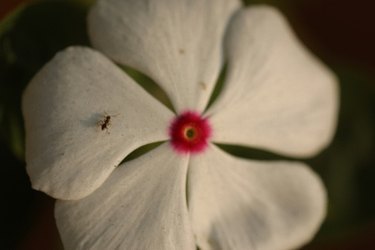
Aphids, or plant lice, are tiny, 1/8-inch long insects that may come in green, red, brown or yellow. They feed on new plant growth by sucking the juices of the leaves, stems or buds. In great number, they can stunt growth and create an unhealthy appearance in plants. Gardeners can choose from a variety of pesticides to kill aphids on their plants.
Causes of Aphid Infestation
Video of the Day
Aphids can be brought into your home or garden from nurseries or garden centers when you introduce new plants. They can also migrate from other yards and gardens in your area. Aphids may infest unhealthy, undernourished plants, as well as overfertilized plants with abundant new growth, according to the Oregon State University Extension site. Aphid infestation can occur on both indoor and outdoor plants.
Video of the Day
Signs of Infestation
You may see a general debilitated appearance in the plants that signal aphid infestation. The aphids themselves collect on the undersides of leaves. New growth may be undersized and distorted. Leaves may be curled. Plants may have a cottony, white mass on surfaces or may feel sticky to the touch. Aphids produce this sticky substance, called "honeydew," when they feed. This honeydew draws ants that often herd and protect the aphids so that the food source continues. Together, these symptoms signal an aphid infestation.
Natural Pesticides for Aphid Control
A hard blast of water is the first defense against aphids attacking your plants. This will discourage aphids from taking up residence in your garden. Introducing insects that feed on aphids is another natural method of control. Lady beetles, green lacewings, earwigs, minute pirate bugs or parasitic wasps will all kill the aphids in your garden. These helpful insects are available at garden centers in your area. Dishwashing liquid, diluted in water at a rate of one tablespoon per gallon water, will remove the waxy, protective coating on aphids and kill them. Test the soap solution on your plants before spraying more generally to see if the plant can tolerate the solution. Commercial insecticidal soaps will kill the aphids while sparing their harder-bodied natural predators.
Chemical Pesticides for Aphid Control
You can also use chemical pesticides to control aphid populations, but these will also kill the beneficial insects that feed on aphids and help to limit their population. These pesticides include acephate and malathion, according to the University of Arizona Cooperative Extension agriculturalist Jeff Schalau. Insect growth regulators are the better choice. These compounds will keep aphids from maturing into adults that will reproduce. Avoid using broad spectrum insecticides that also kill insects that feed on aphids whenever possible.